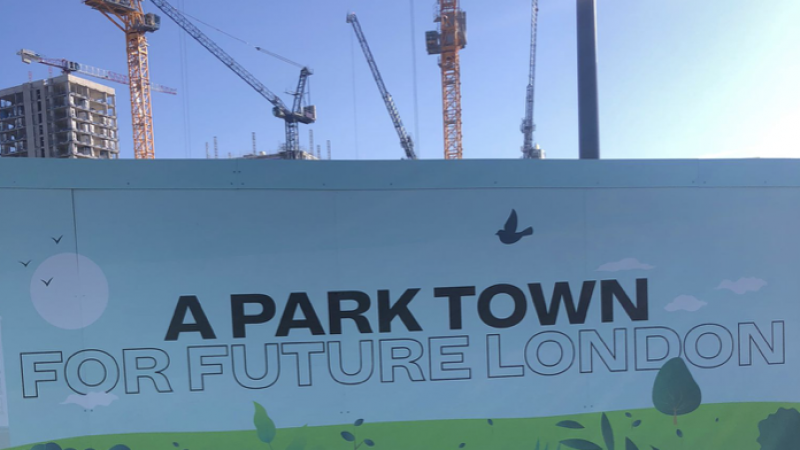
Keir Starmer and Angela Rayner appeared on Friday morning in Brent Cross Town, a development in north west London which styles itself as “a park town for future London”.
The development is a joint venture between Barnet council (Labour took control of the council in May of 2022, although the project has been underway for longer) and Related Argent, the developer responsible for the King’s Cross regeneration (its CEO described the project as “one of the biggest urban regeneration opportunities that London has this decade”). Surrounded by parkland and serviced by a new railway station, parts of the scheme are influenced by the Arts and Crafts movement.
Given all this, plus the fact that it’s located in the must-win Finchley and Golders Green constituency, you can see why it was the perfect place for the leader and his deputy to turn the focus of the campaign to housing and planning. Built on a brownfield site, the new town will ultimately have 6,700 homes; the first phase of the development included a commitment to 20% of properties being affordable, and at present the website lists sale prices as “from £420,000” (parts of the development are also build-to-rent).
My changed Labour Party will give families the opportunity to own their own home. pic.twitter.com/WWxSwkaqTh
— Keir Starmer (@Keir_Starmer) June 7, 2024
Starmer and Rayner toured the site and talked with Henry, a first-time buyer who has bought a flat through a shared ownership scheme in the development. Henry stressed to the politicians that for him, the benefit of owning was less financial, and more to do with the security it provided for him and his family. The three praised the development’s playgrounds and green space. Also present were Finchley and Golders Green candidate Sarah Sackman and London mayor Sadiq Khan.
However, general election campaigns are volatile, and Labour’s best laid-plans to put housing in the spotlight were somewhat scuppered this morning by the Prime Minister’s incomprehensible decision to leave D-Day commemorations early. Given it’s something which the opposition will be very happy to have highlighted, one can’t imagine Labour will have been too unhappy that the vast majority of the media questions to Starmer related to D-Day (allowing him to sound statesman-like by saying that he did, in fact, stay to the end, and mention that he’d met Zelenskyy to boot), and not Labour’s plans to support first time buyers.
🏘️ @Keir_Starmer will not sit by as the Tories leave a generation of young people to become renters for life.
Labour will get Britain building and deliver the change needed to get first-time buyers on the housing ladder. pic.twitter.com/ZXit8zbXNx
— The Labour Party (@UKLabour) June 7, 2024
The plans – a demand-side intervention to expand the Conservatives’ mortgage guarantee scheme titled “Freedom to Buy” – have been met with a more mixed response than many of Labour’s other initiatives in this area (which largely focus on building and planning reform) by pro-housing campaigners who want concentration on supply-side fixes. Meanwhile further to the political left the London Renters’ Union has criticised it, saying “home ownership will not fix the housing crisis”.
Also in the largely overshadowed housing push are plans fleshing out what Labour’s proposed new towns and 1.5m promised homes will actually look like: in a story out last night in the Times, Rayner was quoted as saying that the new builds will be of “exemplary design with real character”, accompanied by artists’ renderings of new-build Edwardian style manor blocks. Meanwhile, the man to whom responsibility for much of this will fall should Labour come to power in a month’s time, shadow housing minister Matt Pennycook, has given an interview to the i newspaper touting Labour’s plans for compulsory purchase orders and housing targets that “bite”.
Housing and planning have long been at the centre of Starmer’s plans for stimulating economic growth and improving the country in the round.
With the help of Rishi Sunak’s D-day antics, and – party management issues aside – Starmer’s broadly steady hand, Labour is holding onto its storming poll lead, but many are predicting that Labour is headed to a victory that is broad, but shallow, with many not-historically Labour areas represented by Labour MPs who will be looking to keep their jobs.
Given that NIMBYism is how many people in UK seek to win elections, and necessary developments are often unpopular, a broad-but-shallow win may make Labour’s ambitious planning and house building agenda particularly challenging. Ultimately, the party may not be too unhappy that through no fault of their own minimal press attention has fallen on this push.




More from LabourList
Economic stability for an uncertain world: Spring Statement 2026
‘Biggest investment programme in our history’: Welsh Labour commit to NHS revamp if successful in Senedd elections
James Frith and Sharon Hodgson promoted as government ministers